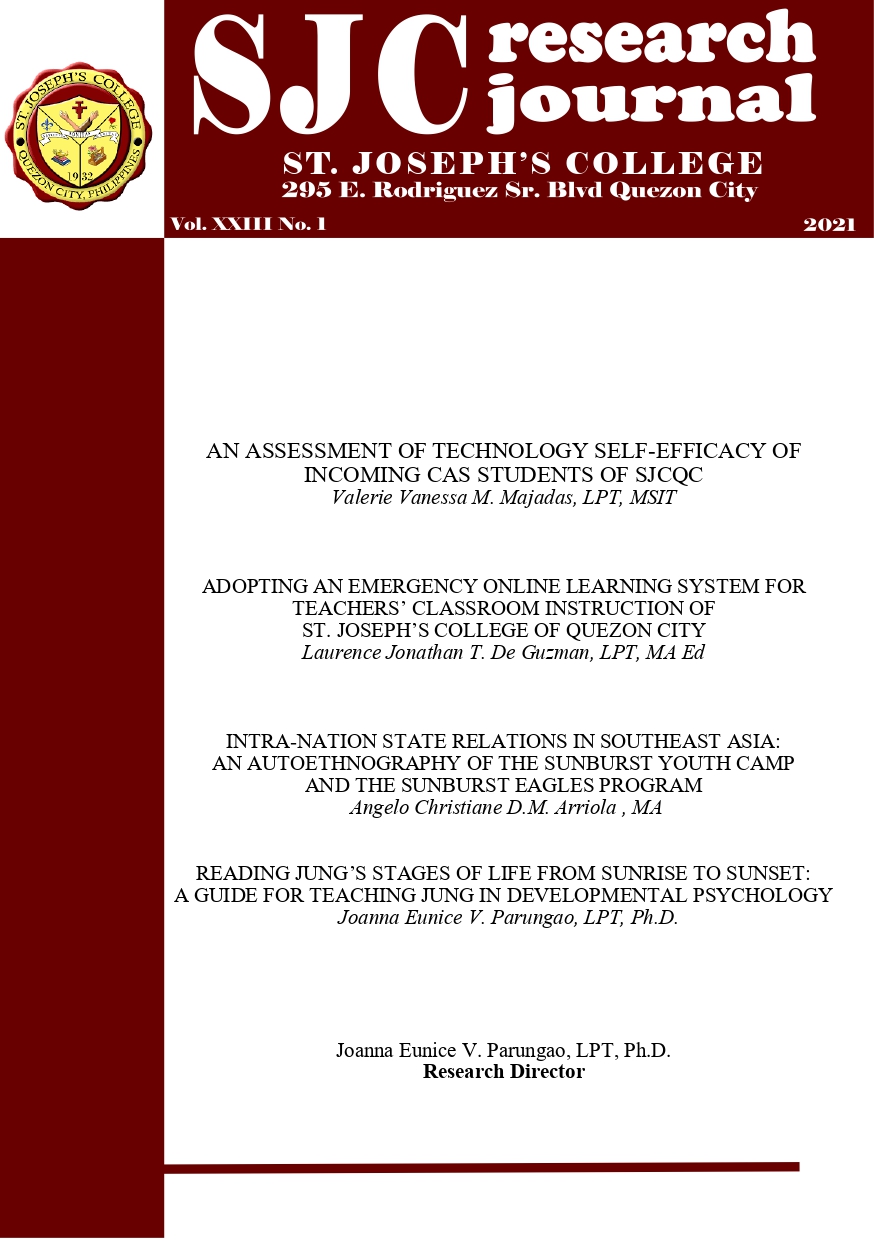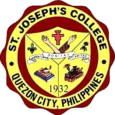
ADOPTING AN EMERGENCY ONLINE LEARNING SYSTEM FOR
TEACHERS’ CLASSROOM INSTRUCTION OF
ST. JOSEPH’S COLLEGE OF QUEZON CITY
Laurence Jonathan T. De Guzman, LPT, MA. Ed
Abstract
The adoption of an emergency online learning system in the Philippines has prompted St. Joseph’s College of Quezon City (SJCQC) to adopt a new instructional mode which utilizes the use of online learning management systems. Pursuant to this mandate by the government, SJCQC has equipped its teachers with the necessary tools to guide them in their adoption of a new mode of instruction through in-house seminars and workshops. In this study, the researcher sought to determine the effects of this paradigmatic shift in classroom instruction by interviewing 13 subjects from SJCQC Senior High School/College Department, Special Education Department, and
Basic Education Department against the backdrop of Picciano’s multimodal analysis model of blended pedagogical purposes. The study found that, while the subjects use several of Picciano’s models, reflection and social/emotional aspects are lacking. However, it appears that the social and emotional aspects are complied with when viewed from the perspective of modern research of Miran-Lopez (2019). Nonetheless, the act of reflection through journaling/blogging is proposed, to help integrate a practice that amounts to self-reflexivity. A revision of Picciano’s model is also proposed, subject to further research.
Keywords: Online Learning, Online Classroom Instruction, Classroom Techniques, Classroom Engagement, Blended with Purpose
An Assessment of Technology Self-Efficacy of Incoming CAS Students of SJCQC
Valerie Vanessa M. Majadas, LPT, MSIT
Abstract
This study aimed to assess the technological literacy of the incoming students in the College of Arts and Science of St. Joseph’s College of QC using the International Society for Technology in Education (ISTE) National Educational Technology Standards for Students (NETS-S) standard. The study’s respondents are 44 new students of the College of Arts and Sciences during the first semester of the school year 2021-2022. Results showed that Computational Thinker garnered the lowest mean score of 2.79, indicating medium level self-efficacy. This means that students are not always comfortable using technology to collect, evaluate, and present data for problem-solving
and decision-making. Based on the students’ weaknesses in each ISTE standard, 26 will undergo remediation and each student may need to remediate multiple standards. Computational Thinker has the most students (20), followed by Technical Proficiency (10), Creative Communicator (9), Global Collaborator (5), Knowledge Constructor (3), and Digital Citizen (1 student). The action plan was based on the assessment result which was used to generate computer-training outcomes with verifiable indicators on how to bridge the skills students lack to perform better as they enter the college level.
Keywords: Action Research, Technological Literacy, Self-Efficacy
READING JUNG’S STAGES OF LIFE FROM SUNRISE TO SUNSET:
A GUIDE FOR TEACHING JUNG IN DEVELOPMENTAL PSYCHOLOGY
By Joanna Eunice V. Parungao, LPT, Ph.D.
Abstract
Most theories on human development are based on age, biological constructs, crises, and abilities. Carl Gustave Jung can be considered a divergent psychologist since he did not confine himself with empirical data. Much of his works show his interest in the spiritual path. It does sound ironic when the topic is psychology, when psyche by definition, means spirit and yet little is discussed about the spirit in psychological theories. This article was embarked to help illustrate and digest the details of Jung’s Stages of Life. It is also the aim of this paper to summarize and interpret pragmatically the mystic qualities of Jung’s concepts by providing current relatable issues to encourage readers, teachers, and students to investigate further and experience the contributions of Jung to the study of the unconscious.
Keywords: Carl Jung, Stages of Life
Intra-Nation State Relations in Southeast Asia:
An Autoethnography of the Sunburst Youth Camp
and the Sunburst Eagles Program
by Angelo Christiane D.M. Arriola
Abstract:
Official ASEAN documents show that the objectives of the Singapore Technologies Endowment Programme (STEP)’s Sunburst Youth Camp and the Sunburst Eagles Program hew closely to the objectives of the ASEAN. Using autoethnography as a research method and Meta Nation State Relations as a framework, the author as a participant examines the two programs as vehicles of Intra-State Nation relations in Asia. The author, as a student at St. Joseph’s College, represented the Philippines in the Sunburst Youth Camp in 2001. Each ASEAN member state mounted its country exhibit. The exhibits were part of the “Knowing ASEAN” seminar, which aimed to present each country “in all its socioeconomic and cultural aspects.” The highlight of the entire Sunburst Youth Camp was the Cultural Nite, when each country would present “traditional” dances. In 2011, the author returned to Singapore as one of the 28 Sunburst Youth Camp alumni chosen to participate in the first-ever Sunburst Eagles Program. Sunburst Eagles is also an example
of Intra-Nation State relations but for professionals. These two programs, as well as other STEP programs, can serve as models to state actors in Asia and beyond. These state actors can use STEP programs to foster better relations with other nations.
Keywords: Autoethnography, Intra-Nation State Relations in Southeast Asia, ASEAN





